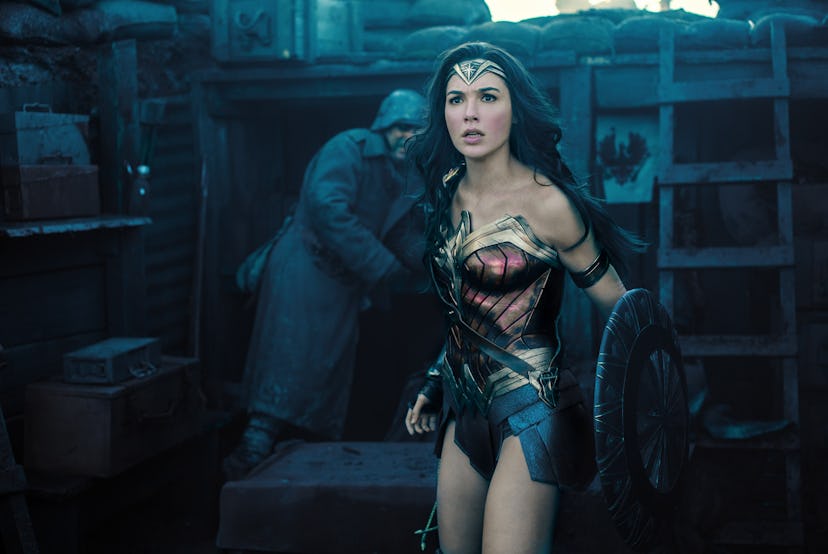James Cameron, Do We Really Have to Explain Wonder Woman to You?

Wonder Woman was the hit of the summer and everyone knows why that’s a big deal. Everyone, it seems, but James Cameron. The Titanic director decided he would very much like to be included in this narrative, and in a new interview with The Guardian declared that Wonder Woman—the highest grossing live action film ever directed by a woman—was actually a step back for how women are portrayed on film.
“All of the self-congratulatory back-patting Hollywood’s been doing over Wonder Woman has been so misguided,” he said. “She’s an objectified icon, and it’s just male Hollywood doing the same old thing! I’m not saying I didn’t like the movie but, to me, it’s a step backwards.”
Cameron than reminds the world that he, a very, very important male director, has also directed films with female protagonists, you see, and that he considers his female characters far superior.
“[The Terminator‘s] Sarah Connor was not a beauty icon. She was strong, she was troubled, she was a terrible mother, and she earned the respect of the audience through pure grit. And to me, [the benefit of characters like Sarah] is so obvious. I mean, half the audience is female!”
Sigh, where to start with this? Let’s ease in with a compliment.
It is true that two of Cameron’s biggest franchises, Alien and The Terminator, started with female protagonists. One an intergalactic warrant officer, the other a “terrible mother.” Cameron certainly deserves credit for those choices and characters, but, lets get it straight, the marketing of those franchises are not necessarily tied to their protagonists. For all intents and purposes, Arnold Schwarzenegger is the star of the Terminator franchise and dominated the marketing and movie posters. No one would dispute that. The Alien franchise is about, well, aliens (yes, we know, the scariest ones are female, but we’re talking about humans here). The franchise has continued on without its original hero Ellen Ripley (as played by Sigourney Weaver), and Weaver wasn’t featured prominently on the movie posters until the sequel.
It’s great these films did center their plots around women and they’re already heavily celebrated for doing so, but, you know, they’re not called Ellen Ripley and Sarah Connor for a reason.
Wonder Woman is called Wonder Woman, and that changes the expectations a bit.
Although, those differences may have just as much to do with the particular genre than anything else.
For those, perhaps like Cameron, who need a review of the situation: Superhero movies are huge right now. They’re basically printing money left and right. Yet, since Marvel upped the game with its cinematic universe conceit, not a single one of these movies from either Marvel or its archrival D.C. have featured a solo female hero. Do you see where we’re going with this, James Cameron? Because everyone else did like five years ago.
Now that we’re caught up, mainstream comic book heroes—the kind who stand alone on the movie poster—are almost always “objectified icons” that lack real human edge. Batman is universally acknowledged as the “darkest” mainstream hero, and even then he’s literally the paragon of privilege in every other way aside from one tragic backstory-shaping event.
As for the objectification part, well, as a film, Wonder Woman was more interested in what Chris Evans had to flaunt in a carnal sense, and over in the Marvel universe it’s literally a rule that their stars have to flash their sweaty six packs at least once a film.
Superheroes are more often than not about relatively edge-free paragons of virtue (or, occasionally, cheeky anti-heroes) who looks great in latex fighting evil. They’re not Coen brothers movies. The fact remains though that Wonder Woman opens the door for other female-led superhero movies in the future. That’s a big deal.
The same sort of big deal the upcoming Black Panther will be for another demographic, another group of directors, and another group of actors. It may not end up be the most nuanced, complicated portrayal of an African-American hero on screen ever (there’s been several, none of them directed by Cameron), but it will still be a breakthrough in the context of the genre. Literally everyone but Cameron seems to understand this and the opportunities such a hit film can create for others.
But maybe we should leave the last word to director Patty Jenkins, who refuted Cameron on Twitter:
“James Cameron’s inability to understand what Wonder Woman is, or stands for, to women all over the world is unsurprising as, though he is a great film-maker, he is not a woman. Strong women are great. His praise of my film Monster, and our portrayal of a strong yet damaged woman was so appreciated. But if women have to always be hard, tough and troubled to be strong, and we aren’t free to be multidimensional or celebrate an icon of women everywhere because she is attractive and loving, then we haven’t come very far have we. I believe women can and should be EVERYTHING, just like male lead characters should be. There is no right and wrong kind of powerful woman. And the massive female audience who made the film a hit it is, can surely choose and judge their own icons of progress.”
Related: Wonder Woman’s 9 Most Surprising Feminist Moments